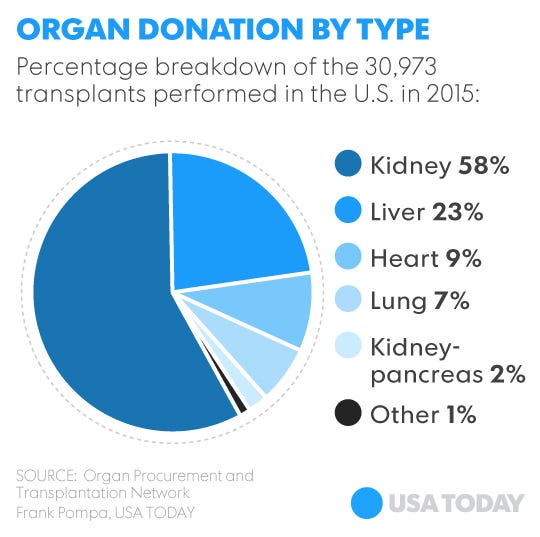U.S. organ transplants reach 30K milestone, thanks to increased donations

Thanks to a steady increase in Americans willing to donate their organs to save the lives of others, organ transplants in the United States reached a milestone in 2015, exceeding 30,000 for the first time, a non-profit group reported Wednesday.
Those 30,973 transplants of kidneys, livers and other organs were nearly 5% more than performed in 2014 and came after years of fairly slow, steady climbs, said officials with the Organ Procurement and Transplantation Network (OPTN). The network coordinates U.S. transplant activities.
“This landmark achievement is a testament to the generosity of the American public to help others through donation, and their trust in the transplant system to honor their life-saving gift,” the group’s president, Betsy Walsh, said in a statement.
Stepped-up organ donations, rather than any breakthroughs in transplant surgery, likely drove increases in recent years, said David Klassen, the network's chief medical officer. Transplant centers also have worked to improve logistics, so that fewer donated organs are discarded, he said.

But, he said, the number of people waiting for organs – now 121,700 – “still dwarfs the numbers of donors each year.”
As of Tuesday, 78,122 of the people on the waiting list were considered “active,” meaning they are eligible for transplant right away. People may move on and off the active list as their health fluctuates, Klassen said. Most are waiting for kidneys, which can come from living or deceased donors.
Each day, about 22 people die while waiting for organs, the network says.
“We could save thousands of more lives each year if more Americans would just take a little time to register as donor, talk to their families about their wishes,” and encourage others to do the same, said David Fleming, CEO of Donate Life America, a non-profit group that runs a national registry at DonateLife.net. Registries also are maintained by every state and listed at organdonor.gov.
“It’s great news that the number of transplants continues to increase each year,” said Jennifer Martin, vice president for constituent services at the National Kidney Foundation, a non-profit advocacy group. “But there’s still a lot of work to do to get organs for everyone who needs them.”

Details from the 2015 transplant data:
• 81% of transplanted organs came from deceased donors.
• The share of donors and recipients who were African American or Hispanic continued to increase – important because they are over-represented on transplant waiting lists. Nearly 22% of recipients were African American and 15.5% were Hispanic.
• Kidneys accounted for nearly 58% of transplants, followed by livers (23%), hearts (9%) and lungs (7%).
